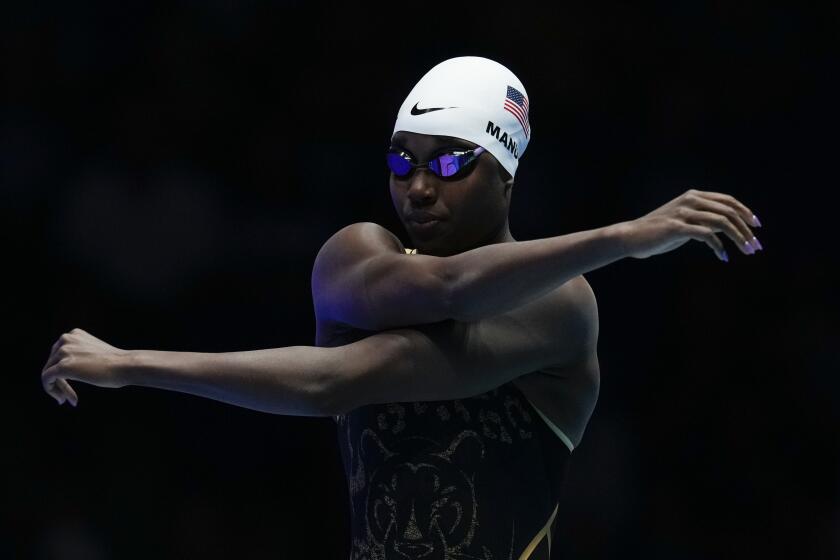It’s a Depressing Story With an Uplifting Ending
Wendy Williams, Olympic diver, crumbled to a heap in front of her refrigerator, sobbing because it was too hard to decide what to have for lunch.
That was the day Williams’ life was saved.
She was depressed, had been for years, all during the time she was winning national championships and an Olympic bronze medal.
She wasn’t alone, although she didn’t know it then.
Now, Julie Foudy, the loud-talking, wide-smiling women’s soccer star, is teaming up with Williams to go around the country and talk about clinical depression.
The Women’s Sports Foundation’s “Minds in Motion Depression Awareness Campaign” also lists Hall of Fame jockey Julie Krone, Olympic skier Heidi Voelker and Olympic gold-medal basketball player Teresa Weatherspoon with Williams and Foudy as part of its program.
“Loudy Foudy,” you wonder. Julie Foudy depressed? Foudy, the jokester and prankster and irrepressible funster, depressed?
That’s the mistake, stereotyping depression.
No, it turns out, Foudy hasn’t suffered from depression of her own. But she watched a family torn apart by it. She saw how embarrassment, how refusal to acknowledge an illness because of a stigma, brought her friends heartache. So Foudy is proud to be involved in this project.
And she urges you to talk to Williams.
Like Foudy, who grew up in Mission Viejo, Williams nurtured her athletic dreams in Orange County.
Williams is 34 now, married and living in Charlottesville, Va. As a youngster, she and her family had moved from St. Louis to Mission Viejo so she could train with the Nadadores, a nationally acclaimed swimming and diving program.
For her efforts, Williams earned an Olympic bronze medal at the 1988 Summer Games in Seoul as well as five national titles.
As long as she had her diving, as long as she had the daily dive list to practice, as long as she had the next world championships or national championships or Olympic Games to prepare for, she could put her crying jags aside. She could lock in a closet the feeling that she was inadequate. She could convince herself that she was silly for feeling so bad.
It wasn’t until Williams had retired from diving and moved to Maui that she could no longer ignore the demons.
Life still seemed perfect. That’s what she tried to tell herself. She had her own massage business. She had friends and a nice apartment in paradise. Every day, she drove high above the sparkling Pacific, along dramatic cliffs. But all Williams wanted to do was drive off the cliff.
“I couldn’t sleep,” she says. “I’d go days without sleeping. I couldn’t eat. And if I decided to eat, I couldn’t decide what to eat. Every decision, the easiest ones, were just totally overwhelming. I was crying all the time and I was doing what I always did.
“I was telling myself to get over it. I had a good life and I had no right to be feeling this way.”
On a day about 10 years ago, Williams says, “I hit rock bottom.”
Curled up in front of her refrigerator, sobbing for hours because she couldn’t decide what to have for lunch, Williams knew she was in trouble.
Since she’d been 3 years old, she was an athlete, a slim, strong, springy girl who seemed born to dive off the 33-foot high platform. As an athlete, she had learned good lessons--lessons about discipline and hard work, about being her best, about setting goals and meeting them. She also thought she’d learned another lesson.
“Mind over matter,” Williams says. “If I was feeling bad, it was up to me to get over it.”
But mind over matter had quit working. For months, she had been thinking of ways to kill herself--”Driving my car off a cliff in Maui,” she says, “I thought of that”--and then the meltdown in front of the refrigerator.
“I hadn’t eaten in days, then, when I tried to make myself [eat], I was overwhelmed with picking something to eat,” she says.
Her roommate found Williams on the floor.
“He made me get up and go to the doctor,” she says. “Thank God he did.
“I had clinical depression and I’ve probably had it all my life. It’s just that, for most of my life, I couldn’t admit to having something wrong. I was an athlete. I was supposed to be able to get over it. Mind over matter.”
Foudy heard Williams’ story and knew it was much like her friend’s.
“People resist admitting they have a problem,” Foudy says. “And you take an Olympic athlete like Wendy, they say, ‘This can’t be affecting me.’ So they don’t look for help and they nearly ruin their lives.
“You know what? Women are two times more likely to get depression. That’s why I wanted to be involved in this. I want to help people understand that there is nothing wrong with getting help.”
That’s why Williams got involved. At first, she wondered if she would be able to stand in front of strangers and tell of her despair. She wasn’t sure it would be comfortable telling the world that she, Wendy Williams, Olympic medalist, takes medication every day.
“People don’t want to admit to a weakness,” she says. “Even though the doctor prescribed Zoloft and it worked, twice I quit taking it. I thought, ‘Hey, I feel fine now so I don’t need this.’ But as soon as I stopped the medicine, I started spiraling downhill.”
Nobody wants to feel dependent on something. Nobody wants to think she can’t be in control, especially an athlete.
“But we can’t control everything,” Williams says. “And there’s still a stigma about depression. There shouldn’t be. It is a treatable illness. So I decided that if I, an athlete, could tell my story and save one person pain, then it was worth it.”
Consider the story told.
*
Diane Pucin can be reached at her e-mail address: diane.pucin@latimes.com.
More to Read
Go beyond the scoreboard
Get the latest on L.A.'s teams in the daily Sports Report newsletter.
You may occasionally receive promotional content from the Los Angeles Times.





